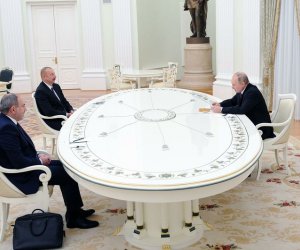Israel's Closest Muslim Ally

On March 3, Prime Minister Benjamin Netanyahu will address the United States Congress in what has become one of the most anticipated political speeches to be delivered in some time. The subject of the speech will be Iran, a country that has had a long adversarial relationship with Israel, often because of religious and political differences. But there is one Muslim nation -- Azerbaijan, a neighbor to Iran no less -- that enjoys a peaceful and productive relationship with Israel.
Azerbaijan is geographically important, since, in addition to Iran, it borders Russia, Georgia, and the Caspian Sea in the Caucasus region, where western Asia meets eastern Europe. "The country, which is the size of South Carolina," The New York Times Magazine observed in a recent major profile, "has 9.2 million people and is cut off from any oceans.... It does, however, have oil."
All of this ended in 1920 when Azerbaijan was annexed into the Soviet Union and the oil industry there virtually died. Still, during World War II, Hitler yearned for the Baku oil fields and gave up on capturing them only after Soviet troops soundly defeated invading German forces. Azerbaijan remained a part of the U.S.S.R. until it disintegrated in 1991. In October of that year, Azerbaijan declared itself an independent republic. Heydar Aliyev was elected president in 1993; his son, Ilham, is president today. Israel recognized Azerbaijan in 1991 and established cordial diplomatic relations with the country in 1993. Over the years, the relationship between the two nations has only grown closer.
One recent report observed that Azerbaijan has so much oil "[p]arts of the countryalmost float on [it]." Not surprisingly, then, the country's oil production has reached one million barrels per day. A key trading partner is Israel, which imports 40 percent of its oil from Azerbaijan. "For Israel," The Jerusalem Chronicle reported, "which cannot tap into the Arab oil market and has been forced to ship oil in the past from as far away as Mexico, the relatively close Azerbaijani source is a strategic asset. The oil is pumped through the Baku-Tbilisi-Ceyhan pipeline to Turkey's Mediterranean shore."
Trade is reciprocal. "Commerce [has] flourished," according to The Washington Times, "with Israel becoming a major importer of Azerbaijani oil and Israel's technology industry aiding Baku with such projects as telecommunications infrastructure." In fact, one former Azerbaijani official revealed: "Our deal with Israel is twice the size of our trade with Russia, which doesn't have any hi-tech to sell us."
Azerbaijan has been able to establish this trade relationship in part because the country has a history of religious progressivism. Dominated by the Shia denomination, it was the first Muslim country to grant women the same political rights as men. "A secular yet majority Muslim society," an Azerbaijani foreign minister wrote in The Hill, "[the country] has enjoyed centuries of peaceful coexistence between the three great monotheistic faiths: Islam, Christianity, and Judaism." In fact, a Jewish community -- today totaling 9,100 but reaching as many as 60,000 in the past -- has lived safely in Azerbaijan for hundreds of years.
While Muslim-dominated countries like Iran harbor contempt for Israel -- the reason Netanyahu is speaking to Congress -- Azerbaijan could not be more different. As one publication recently pointed out, "What started as a marriage of convenience has netted Israel its closest Muslim ally."
ANN.Az
Similar news
Similar news
Latest news 
More news 



































 Photo
Photo 



 Video
Video 

